“Daddy, I have had to kill you. You died before I had time—— Marble-heavy, a bag full of God…” So Sylvia, the eldest of two children of the Plath couple would write, on her father. In1940, Mr. Plath suffered from an advanced stage of diabetes, so much so that it threatened his life. He died on the night of November 5th, the same year Sylvia Plath was but a girl of eight. This massive loss, as referenced much later in speculation and honest curiosity would be termed as the first real touch with grief and its conflicting emotions of love, pain, hurt, and anger for Plath. “...Bit my pretty red heart in two. I was ten when they buried you. At twenty I tried to die And get back, back, back to you. I thought even the bones would do.” So hard was the cross to bear, that her lifelong affiliation towards religious ambigu- ity may have stemmed from the very incident. This death would spur a pattern that caused stress and depression, that would lead to illnesses all throughout her life. “It was a queer, sultry summer,*they executed the Rosenbergs, and I didn’t know what I was doing in New York. I’m stupid about executions. The idea of being electrocuted makes me sick... I couldn’t help wondering what it would be like, being burned alive all along your nerves.” When Plath consciously attempted suicide at 20, it lead to hospitalization where she was treated with electro-shock therapy. The gruesome nature of this experience is again portrayed so in Plath’s fictional work, The Bell Jar, where the protagonist Esther Greenwood reflects what she has done to be punished this way. “Nobody sees us, Stops us, betrays us; The small grains make room - - - We shall by morning Inherit the earth. Our foot’s in the door.”
 BROWN BOX MAGAZINE Page 7 Page 9
BROWN BOX MAGAZINE Page 7 Page 9